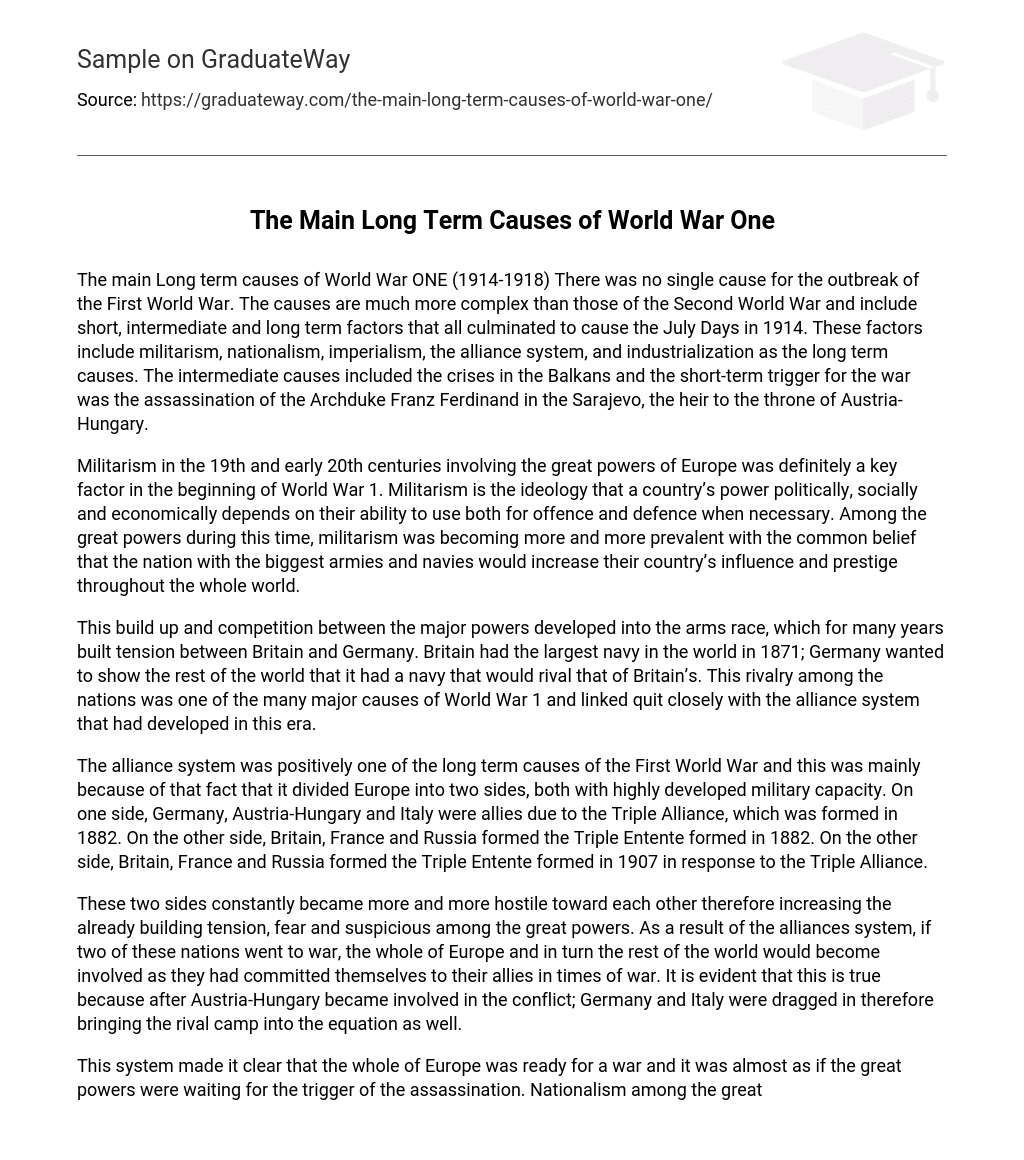Several interconnected factors, including militarism, nationalism, imperialism, the alliance system, and industrialization were responsible for sparking the outbreak of World War One (1914-1918). Furthermore, immediate triggers such as crises in the Balkans and the assassination of Archduke Franz Ferdinand in Sarajevo resulted in the July Days in 1914.
Militarism was a key factor in starting World War 1, especially among the powerful nations of 19th and early 20th century Europe. It involved the belief that a nation’s strength in politics, society, and economy depended on its ability to use military force for defense and offense when necessary. During this time, major powers placed more importance on militarism as they saw it as a way to increase their country’s global influence and reputation by having the biggest armies and navies.
The competition among major powers during this period resulted in an arms race. In 1871, Britain possessed the largest navy globally, and Germany aimed to exhibit its naval capabilities on par with Britain’s. This rivalry played a significant role in the onset of World War 1 and was closely intertwined with the establishment of alliances at that time.
The division of Europe into opposing sides through the alliance system was a major underlying factor in causing the First World War. In 1882, Germany, Austria-Hungary, and Italy established an alliance known as the Triple Alliance. In response to this alliance, Britain, France, and Russia formed their own alliance called the Triple Entente in 1907.
The escalating animosity between the two factions caused a surge in tension, fear, and mistrust among the major powers. The system of alliances ensured that if any two countries went to war, Europe and the rest of the world would also become involved because of their commitment to their allies during times of strife. Austria-Hungary’s participation in the conflict led to Germany and Italy being dragged into the situation, thus engaging the opposing faction as well.
The outbreak of the First World War exposed Europe’s readiness for conflict, as the major powers anticipated that the assassination would act as a triggering event. Nationalism played a vital role in propelling these influential European countries towards war during the 19th century. By prioritizing their own nations above all else, nationalism nurtured strong sentiments that ultimately precipitated the onset of the First World War.
During the 19th century, Germany and Italy were united through nationalism, resulting in a strong sense of national pride. Despite the establishment of the Alliance system, powerful nations remained committed to nationalism. Germany stood out for its passionate nationalism and reputation as a successful country with a strong military and overseas colonies. These factors played a crucial role in shaping German culture and race.
Imperialism in the 19th century was the dominant political doctrine characterized by nations desiring to own colonies and form empires. This common desire among the great powers was one of the major causes of World War 1, as it focused on what was happening in the colonies of these powers, rather than in Europe itself. As countries such as Germany grew stronger and more unified, they recognized that imperialism was crucial to gaining international power and influence. This led to the scramble for Africa in the late 19th century.
The event that triggered the war was the fact that Africa remained largely uncolonized, leading major European powers to search for remaining land for their countries. This resulted in colonies pledging support to their motherland during conflicts, which ultimately made the war global and caused warfare to extend beyond Europe.
While not the primary cause, it would be incorrect to completely disregard the assassination of Archduke Franz Ferdinand as a factor in causing the First World War. Tensions were already rising in Europe, especially in the Balkans. The aftermath of the Balkan Wars had created deep hostility between Austria-Hungary and Serbia.
A covert terrorist organization known as ‘Black Hand’ emerged in Serbia, holding great significance among Serbian nationals as it was established on their National Day. This further fueled anti-Austrian sentiments.
Additionally, the main motive behind this assassination was the Archduke’s position as the future leader of Austria-Hungary, a nation that Serbia saw as its enemy. The aftermath had significant consequences, leading to Austria-Hungary’s anger and gaining support from Germany and Italy in all matters related to this matter. Furthermore, besides escalating tensions in the Balkans, this incident also gave major powers a reason to alleviate long-standing conflicts between these opposing factions.
The origins of the First World War can be traced back to a combination of factors that had been developing in Europe since the 19th century. Historians argue that this war resulted from multiple political, social, and economic changes, as well as the assassination of Franz Ferdinand. However, it is clear that all these causes were equally significant and had a strong impact on the events following the invasion of Belgrade.





